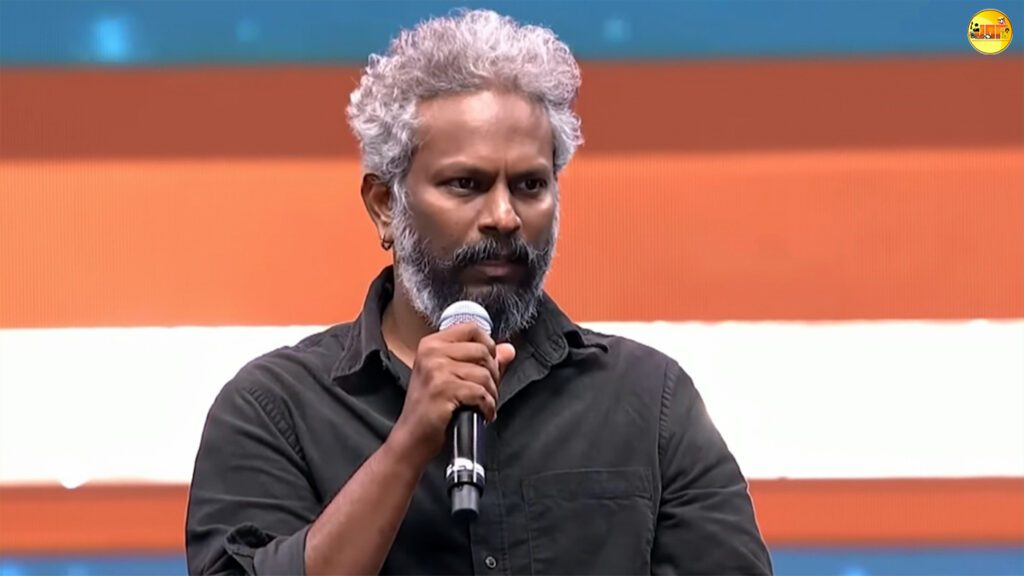The director Thiagarajan Kumararaja recently made news while denouncing oppression of learning from the past that he linked with injustices today. In a public hearing, he mentioned Dronacharya, Rajaji, and others as those who actively denied learning access to marginalized groups. Kumararaja announced that today’s learning policy must counter those injustices of the past and accelerate social justice by means of inclusion at school. Comments have stirred debate within Tamil artistic, political, and intellectual circles.

Kumararaja’s comments are particularly remarkable considering that he is a director who is known for Aaranya Kaandam and other experimental cinema projects. That he would venture into social commentary on education indicates that he is interested in exploring deeper social issues outside of celluloid.
Who Is Thiagarajan Kumararaja?
Before we dig deeper into him, we require some background on Kumararaja. He did a Visual Communications course at Loyola College, Chennai, but dropped out of college later to explore out into filmmaking. His initial feature was Aaranya Kaandam (2010), famously recognized already as Tamil cinema’s very first neo-noir, cult classic by its gritty stories as well as experimental visual sensibility. His name has become identified with cinematic transgression as well as sophisticated thought ever since.
Given that he speaks from a creative vantage point, when Kumararaja critiques educational suppression, he does so with both moral authority and artistic legitimacy.
What Kumararaja Said: Education Denied, Voices Silenced
The heart of Kumararaja’s speech lies in these assertions:
- Historical oppression: He cited names like Dronacharya, Rajaji, and others who, he thought, practiced or embodied policies that did not allow “lower” groups or suppressed groups from being educated. As he explains, “We were not allowed to read; they suppressed our will to learn.”
- Dravidian vs. Aryan narratives: He pitted Dravidian thinking against Aryan discourses by proposing that mainstream ideologies silenced native discourses and local pedagogy traditions with an aim towards oppressive regimes.
- Contemporary critique: Kumararaja criticized the central government for not giving money to Tamil Nadu’s education programs. He remarked that when questioned, those who do not give money say states are over-spending. He referred to that as a moral injustice.
- Vision of inclusion: He appealed that if a party responsible for equality is at the helm of affairs, then its mission always remains that “everyone is allowed to learn,” regardless of caste, class, or background. He cited Tamil Nadu government programs like midday meals and scholarship schemes as good efforts but challenged them to do more.
He made an emotional appeal: “However many crores you may have, education that you share with others does not diminish. Knowledge does not die; it remains.” That image struck a chord in the listeners’ hearts.
Responses & Ripples in Media & Culture
In the immediate aftermath, social media reactions have ranged widely:
- Praise from supportive commentators was forthcoming for speaking truth to power by holding him up as courageous at a moment when many creatives are silent.
- Critics questioned whether calling historic figures suppressors amounts to simplification, if a director oversteps his bounds. Some commentators noted that such criticisms are common enough within the scholarly or political realms but rare within popular media, therefore holding him open to criticism.
- His remarks were seen by observers of the policy as timely: Tamil Nadu’s education initiatives are up for re-examination, and spending disputes with the central government persist. His speech adds cultural heft to that debate.
How This Ties to Tamil Nadu’s Educational Landscape
Kumararaja’s critique cuts across current policy realities:
- Tamil Nadu has always been praised for social welfare and education-related programs like midday meals, scholarships, free textbooks, etc.
- But the state is also in conflict with the central government regarding school financing. The central government has been blamed for declining grants or putting on hold payments.
- More equitable access to higher education is always needed by already marginalized and rural groups.
- He explains that if policies are not mindful of caste, language, and exclusion of the past, equality of education is still an aspiration.
So his words are not just rhetoric; they cast shadows over actual policy disputes and learning inequalities.

